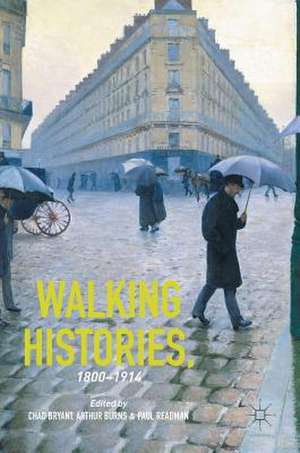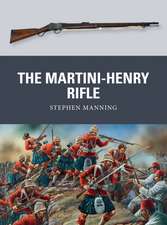Walking Histories, 1800-1914
Editat de Chad Bryant, Arthur Burns, Paul Readmanen Limba Engleză Hardback – 26 apr 2016
Preț: 589.02 lei
Preț vechi: 692.96 lei
-15% Nou
Puncte Express: 884
Preț estimativ în valută:
112.72€ • 117.25$ • 93.06£
112.72€ • 117.25$ • 93.06£
Carte tipărită la comandă
Livrare economică 14-28 aprilie
Preluare comenzi: 021 569.72.76
Specificații
ISBN-13: 9781137484970
ISBN-10: 1137484977
Pagini: 332
Ilustrații: XV, 332 p.
Dimensiuni: 148 x 210 x 24 mm
Greutate: 0.56 kg
Ediția:1st ed. 2016
Editura: Palgrave Macmillan UK
Colecția Palgrave Macmillan
Locul publicării:London, United Kingdom
ISBN-10: 1137484977
Pagini: 332
Ilustrații: XV, 332 p.
Dimensiuni: 148 x 210 x 24 mm
Greutate: 0.56 kg
Ediția:1st ed. 2016
Editura: Palgrave Macmillan UK
Colecția Palgrave Macmillan
Locul publicării:London, United Kingdom
Cuprins
Introduction: Modern Walks; Chad Bryant, Arthur Burns and Paul Readman.- PART I: WALKING, SPACE, AND BOUNDARIES.- 1. Walking the Boundaries between Modernity and Tradition; Robert Gray.- 2. Strolling the Romantic City; Chad Bryant.- 3. Rites of Passage; Simon Sleight.- PART II: THE OPTICS OF WALKING.- 4. Walking as Labour in Henry Mayhew’s London; Elizabeth Coggin Womack.- 5. ‘Efficiency on Foot’? The Well-Run Estate of Nineteenth-Century Britain; Julie Hipperson.- PART III: WEEKEND WALKING, OR NOT.- 6. Accidents Will Happen; Arthur Burns.- 7. ‘A Good Walk Spoiled?’ Golfers and the Experience of Landscape during the Late Nineteenth Century; Clare V. J. Griffiths.- 8. Urban Space and Travel on the Jewish Sabbath in the Nineteenth Century; Barry Stiefel.- PART IV: WALKING, CONTEMPLATION, AND THE SELF.- 9. The Saints Who Walk; Iqbal Sevea.- 10. Walking in Andrei Bely’s Petersburg; Angeliki Sioli.- 11. Walking and Environmentalism in the Career of James Bryce; Paul Readman.-
Recenzii
“What is striking and perhaps novel here is the range of perspectives that the authors collectively bring to the subject. … Here are a series of highly intelligent and rigorously researched essays whose variety allows us to look beyond the classic ‘Romantic walker’ and urban flaneur … and is surely now a must-read for anyone interested in the history of walking.” (Peter Borsay, Social History, Vol. 42 (3), July, 2017)
“This collection has a truly global reach. .. no one could read this rich and resonant collection without learning something … .” (William Whyte, English Historical Review EHR, Vol. 132 (556), June, 2017)
Notă biografică
Chad Bryant is Associate Professor in Central and Eastern European History at the University of North Carolina at Chapel Hill, USA. He is author of Prague in Black: Czech Nationalism and Nazi Rule (2007) and is co-editor, with Cynthia Radding and Paul Readman, of Borderlands in World History, 1700-1914 (2014).
Arthur Burns is Professor of Modern British History at King’s College London, UK. His books include Rethinking the Age of Reform: Britain 1780-1850 (2003), co-edited with Joanna Innes, and St Paul’s: The Cathedral Church of London 604-2004 (2004), co-edited with Derek Keene and Andrew Saint.
Paul Readman is Professor of Modern British History at King’s College London, UK. His publications include Land and Nation in England: Patriotism, National Identity and the Politics of Land 1880-1914 (2008), and as co-editor with Chad Bryant and Cynthia Radding, Borderlands in World History, 1700-1914 (2014).









